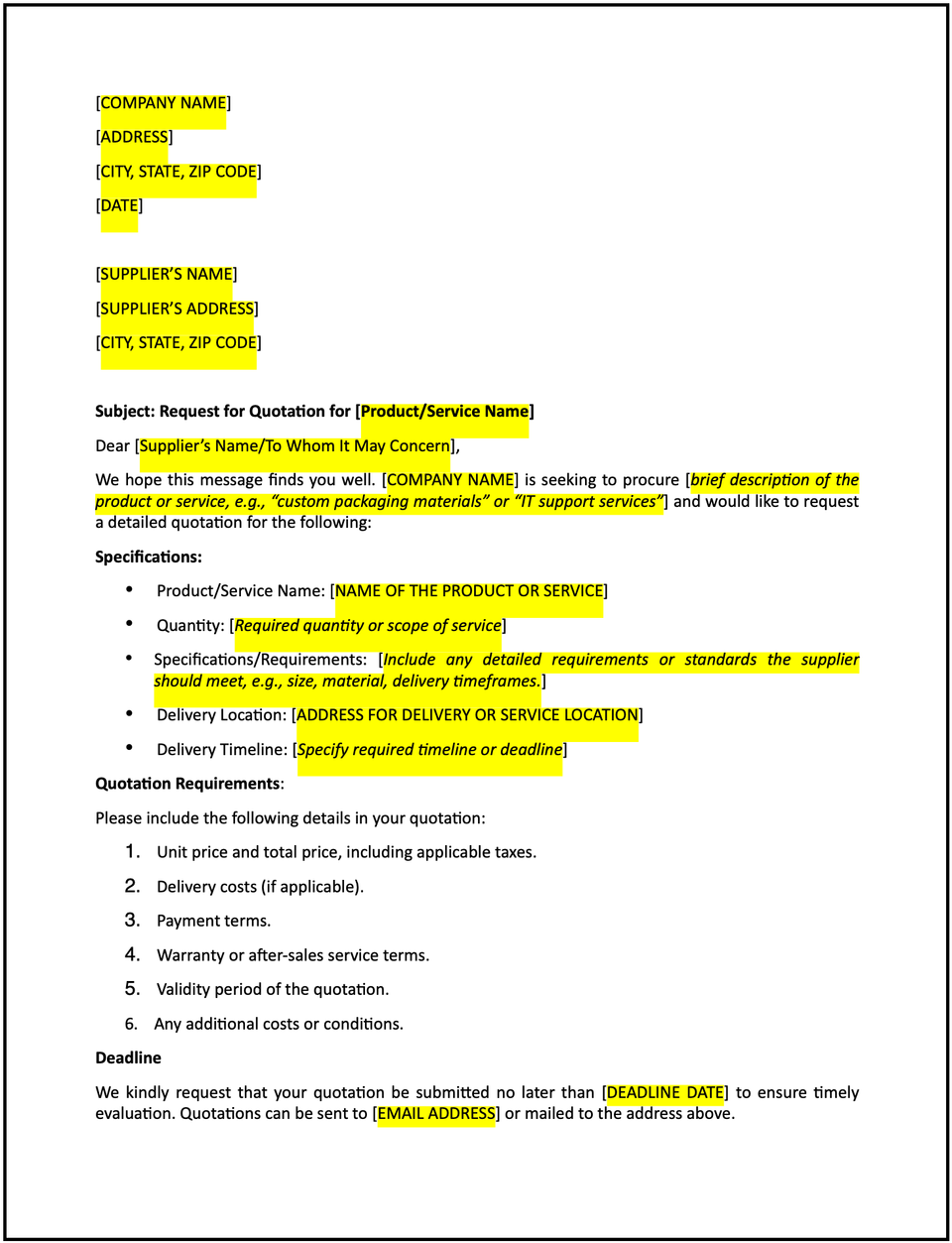Letter of request for quotation (RFQ) from a supplier: Free template

Letter of request for quotation (RFQ) from a supplier
A letter of request for quotation (RFQ) is a formal communication used to ask a supplier for pricing and terms for specific products or services. This letter outlines the required details, such as quantities, specifications, and timelines, enabling the supplier to provide an accurate and competitive quotation.
How to use this letter of request for quotation (RFQ) from a supplier
- Open with an introduction: Address the recipient respectfully and provide context for your request, referencing your organization and its needs.
- Specify the purpose: Clearly communicate your intent to request a quotation for products or services.
- Provide details: List the specific items or services you require, including quantities, specifications, and any other relevant details.
- Highlight key requirements: Indicate any delivery timelines, payment terms, or quality standards that need to be met.
- Request a response: Specify the format for the quotation, such as a formal proposal or a detailed cost breakdown, and include a deadline for submission.
- Offer collaboration: Indicate your willingness to provide additional details or answer any questions the supplier may have.
- Maintain a professional tone: Ensure the letter is clear, respectful, and focused on fostering a constructive relationship.
- Provide contact information: Include details for the recipient to submit the quotation or reach out with questions.
Benefits of using a letter of request for quotation (RFQ) from a supplier
This letter ensures a structured and professional way to request pricing details while fostering trust and collaboration. Here’s how it helps:
- Promotes clarity: Providing detailed requirements ensures suppliers can deliver accurate and relevant quotations.
- Reflects professionalism: A well-crafted letter demonstrates respect and commitment to fair and transparent processes.
- Encourages competition: Requesting multiple quotations ensures you receive the best value for your needs.
- Supports decision-making: Detailed responses enable informed comparisons and procurement choices.
- Fosters relationships: Open communication establishes trust and engagement with suppliers.
Tips for writing an effective letter of request for quotation (RFQ) from a supplier
- Be specific: Clearly list the items or services needed, including detailed specifications and quantities.
- Use professional language: Maintain a respectful and collaborative tone to encourage prompt responses.
- Provide context: Briefly explain why the quotation is needed, such as for a new project or supplier evaluation.
- Highlight deadlines: Include a clear timeline for submitting the quotation to ensure timely responses.
- Include actionable steps: Share instructions for submitting the quotation and any additional documents required.
- Keep it concise: Focus on the key points while ensuring the tone is professional and engaging.
Frequently asked questions (FAQs)
Q: What details should I include in this letter?
A: Include the purpose of the RFQ, a detailed list of items or services required, timelines, and submission instructions.
Q: Should I personalize the letter?
A: Yes, addressing the recipient by name and referencing your relationship or past interactions demonstrates attentiveness.
Q: Who typically sends this letter?
A: Procurement managers, purchasing teams, or business owners typically send this letter.
Q: How formal should this letter be?
A: The tone should be professional and respectful, focusing on fostering collaboration.
Q: When should this letter be sent?
A: Send the letter when planning purchases, evaluating suppliers, or seeking competitive pricing for specific needs.
Q: Can this letter request additional information beyond pricing?
A: Yes, you can request details such as lead times, payment terms, or warranty information.
Q: Is acknowledgment from the recipient required?
A: While not mandatory, requesting acknowledgment ensures the supplier has received and is addressing your request.
This article contains general legal information and does not contain legal advice. Cobrief is not a law firm or a substitute for an attorney or law firm. The law is complex and changes often. For legal advice, please ask a lawyer.


